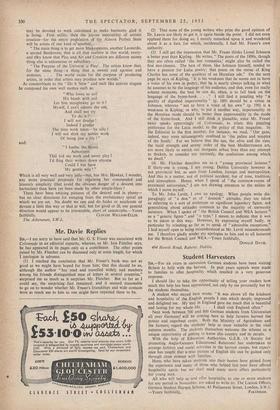Mr. Davie Replies
Snt,—I am sorry to have said that Mr. G. S. Fraser was associated with Colonnade in an editorial capacity, whereas, as Mr. Iain Fletcher says, he has appeared in its pages only as a contributor. The other points raised by Mr. Fletcher can be discussed only at some length, for which
I apologise in advance.
(1) I reached the conclusion that Mr. Fraser's book was not so good as we might have hoped for from him; that this should be so, although the author "has read and travelled widely and numbers among his friends distinguished men of letters in several countries," surprised me as much as it surprises Mr. Fletcher. But so far as I could see, the surprising fact remained; and it seemed reasonable to go on to wonder whether Mr. Fraser's friendships and wide contacts were as much use to him as one might have expected them to be. (2) That none of the young writers who prize the good opinion of Dr. Leavis are likely to get it, is again beside the point. I did not even applaud them for doing so; I merely remarked upon it and wondered about it as a fact, for which, incidentally, I had Mr. Fraser's own authority.
(3) I still 'get the impression that Mr. Fraser thinks Lionel Johnson a better poet than Kipling. He writes, " The poets of the 1890s, though they are often called ' the last romantics,' might also be called the first neo-classics. The best of them, like Johnson himself, tended to have a passion for Latin poetry; that poem on the statue of King Charles has some of the qualities of an Horatian ode." On the next page he says of Kipling, " It is his weakness that he seems not to have a voice of his own in poetry, that he is nearly always talking in what he assumes to be the language of his audience, and that, even for really solemn moments, the best he can do, often, is to fall back on the language of the hymn-book. . . " I still find it puzzling why " a quality of dignified impersonality " (p. 189) should be a virtue in Johnson, whereas " not to have a voice of his own " (p. 190) is a weakness in Kipling; or why, to put it another way, impersonality in the Horatian mode should be better than impersonality' in the mode of the hymn-book. And I still think it plausible, since Mr. Fraser twice speaks approvingly of Colonnade, to relate this puzzling preference for the Latin model, to the policy of that magazine. In the Editorial to the first number, for instance, we read, " Our gaze, indeed, may seem intransigently confined to ' the palms and temples of the South.' For we believe that the sun, the olive and the vine, the lucid strength and serene order of the best Mediterranean art, are more likely to enrich our inorganic urban lives than any attempt to thicken, to consider too curiously, the confusions among which we dwell."
(4) Mr. Fletcher describes me as a " young provincial lecturer." If thirty-one is young, 1 am young; Dublin University however is not provincial but, as seen from London, foreign and metropolitan. And this is a matter, not of political accident, but of tone, tradition, and atmosphere. Hence, when I speak of " the common-rooms of provincial universities," I am not drawing attention to the milieu in which I move myself.
To Mr. John Levitt, 1 owe an apology. When people write dis- paragingly of " a don " or of " donnish " attitudes, they are taken as referring to a sort of archetype or significant legendary figure, not generalising about attitudes common to the majority of university lecturers. When I spoke of " the British Council and WEA lecturer " as a " generic figure " and " a type," I meant to indicate that it was to be taken in this way; However, by expressing myself badly, in particular by relenting so far as to speak of " admirable exceptions," I laid myself open to being misunderstood as Mr. Levitt misunderstands me. I therefore gladly tender my apologies to him and to all lecturers for the British Council and WEA.—Yours faithfully,
494 Howth Road, Ralteny. Dublin.
DONALD DAVIE.


































 Previous page
Previous page